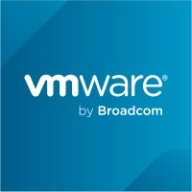

Hyper-V and VMware vSphere are two popular virtualization platforms competing in the virtualization category. Hyper-V seems to have the upper hand for organizations with budget constraints due to its cost-effectiveness being included with Windows Server licenses. Conversely, VMware vSphere offers more advanced features that appeal to larger enterprises despite the higher cost.
Features: Hyper-V provides integration with Windows Server, offering dynamic memory allocation, live migration, and Hyper-V Replica for scalability and efficiency. VMware vSphere, on the other hand, includes centralized management, VMotion, and Distributed Resources Scheduling (DRS) for optimized resource utilization and performance, positioning it well for enterprise-level requirements.
Room for Improvement: Hyper-V needs to refine its dependency on Windows, performance, and feature expansion to non-Windows platforms. VMware vSphere could improve in areas like fault tolerance, pricing structures, and third-party integration while maintaining its comprehensive feature set.
Ease of Deployment and Customer Service: Both Hyper-V and VMware vSphere offer diverse deployment options, including on-premises and cloud models. Hyper-V is easily deployed with Windows Server, streamlining processes for Microsoft ecosystem users. VMware stands out with superior customer service and extensive documentation, albeit requiring specialized knowledge for its complex features.
Pricing and ROI: Hyper-V remains a cost-effective solution, included with Windows Server, which is advantageous for small to medium enterprises. VMware vSphere, however, justifies its higher pricing with a features-rich suite that offers substantial returns in complex virtualization setups, though it may be prohibitive for smaller budgets.
You need only one physical server that can host several virtualized servers within the same physical server instead of having multiple physical servers.
It saves us money compared to VMware because we still need to pay Microsoft licenses, but in addition to that we need to pay for VMware for virtualization.
We can say 10% is the approximate amount of savings because most of the things are automated and streamlined, so the manual work is eliminated in most cases.
Technical support from Microsoft is excellent, rated ten out of ten.
The technical support for Hyper-V is excellent
The technical support is very good
Priority one issues are usually addressed by engineers within one to two hours.
Recently, support has been less friendly and slower, especially after the company was acquired by Broadcom.
If we have issues, the support tends to be unreliable
There is a redundancy cost for high availability because data are stored mirroring on two nodes.
Hyper V can support over two hundred virtual processors and around 12 TB of memory.
The scalability of Hyper-V is great; I would rate it nine out of ten.
Scaling is easy, whether it is hyperconverged or a three-tier architecture.
VMware vSphere is highly scalable in terms of the number of users and the number of servers it can handle.
It is a highly scalable solution.
Automation is unavailable, and reporting is difficult.
Frequent Windows updates can impact stability compared to VMware ESXi.
We have stable performance, but we see some glitches with some snapshots on Linux boxes in Linux virtual machines.
It is a very stable hypervisor solution.
While they are generally stable, if outages occur, they tend to be due to brands like HP or Dell, not VMware vSphere itself.
Mostly we don't have issues, but sometimes we have faced some stability issues because of some bugs and some CPU compatibility issues with Intel CPUs.
Hyper-V should ensure the features of VMware are covered within its platform.
Hyper-V could be improved by implementing the same set of features that other tools provide.
In future updates, I would like to see improvements in reporting and a resolution to some security weaknesses.
The cost changed from perpetual to subscription, and there is a need for alternative solutions.
Another area is the stability during upgrades from older versions to newer versions, where we face issues.
Sometimes, it is difficult to find documentation for specific tools and solutions.
Hyper-V is completely free and requires no licensing fee.
Hyper-V's licensing costs are lower compared to VMware, making it cost-effective for smaller workloads.
Until 2019, Hyper-V was a cost-effective solution because it was available as a free product.
Many customers are trying to avoid it due to its high cost.
Costs significantly increased from perpetual to subscription, with prices rising by two to three times over three to five years.
The solution is too expensive.
It is completely free, which is a significant advantage.
I have seen return on investment with Hyper-V because it is both time-saving and cost-effective.
We switched to Hyper-V because it was lower cost than paying for high availability in VMware.
The vMotion feature is beneficial for online migration of virtual machines from one host to another without downtime.
The tool is highly available, which is crucial for implementing critical applications requiring 24/7 availability.
I always use VMware vSphere vMotion; we work with this feature all the time. vMotion is very useful; that's why we use the virtualization.
| Product | Market Share (%) |
|---|---|
| VMware vSphere | 18.9% |
| Hyper-V | 18.2% |
| Other | 62.900000000000006% |



| Company Size | Count |
|---|---|
| Small Business | 70 |
| Midsize Enterprise | 37 |
| Large Enterprise | 46 |
| Company Size | Count |
|---|---|
| Small Business | 175 |
| Midsize Enterprise | 137 |
| Large Enterprise | 259 |
Hyper-V is a hardware virtualization tool that allows users to create virtual computer environments with multiple operating systems on a single physical server. Each virtual machine has computer parts, such as memory, processor, storage, and networking, and acts like a standard computer - running its own operating system and software programs. Each component of the virtual machine can be configured to meet your specific requirements.
Hyper-V creates a cost-effective, stable, and productive server virtualization environment by running multiple operating systems, such as Windows, Linux, and more, in parallel on one machine or server. Each virtual machine runs in its own isolated space, which means you can run many virtual machines simultaneously but independently of each other. This helps prevent problems such as a crash affecting the other workloads and enables different users to separately access various systems.
Benefits of Hyper-V
Hyper-V key features:.
Reviews from Real Users
Hyper-V stands out among its competitors for a number of reasons. Several major ones are its flexibility, its replication capabilities, and the fact that its virtual machines utilize a small amount of resources..
Liam L., the owner of a tech services company, writes, “It is actually very low on resources. It doesn't use many resources. It is also very easy to tailor. You can change things like the amount of memory and storage on the fly. It is very stable and reliable. I like its replication feature, which is very good. It is also very easy to move the virtual machines across push servers without any difficulty. Its performance is also very good. Now with this pandemic, a lot of workers are working from home. A lot of workers have been using laptops as their desktop computers, and they would remote into a virtual PC. There is no difficulty, and they can't tell the difference between this and the real one. It is much easier to manage.”
Kevin E. an IT director at Homeland Technology Group, LLC, notes, “We've probably seen a 50 percent speed increase on our SQL server. Hyper-V has also significantly reduced our downtimes with faster boot-up and reboot. If we have to reboot a server, there is maybe two or three minutes of downtime. When we were on a bare-metal server, it could be five to ten minutes due to the total boot time.”
VMware vSphere offers robust virtualization capabilities with features that enhance data center performance and optimize workloads. Centralized management and ease of deployment make it a cost-effective choice for many industries.
VMware vSphere is recognized for its high availability, vMotion, and Distributed Resource Scheduler, essential for efficient server infrastructure management. Users value its virtual machine management, seamless live migration, and strong resource allocation across data centers. Though the web client can be slow, and individual management of multiple ESXi hosts is challenging without central management, vSphere remains popular due to its flexibility and integration capabilities. While fault tolerance and free version features have their limitations, the product supports private clouds and hybrid cloud deployments effectively.
What are the key features of VMware vSphere?VMware vSphere is widely used in industries to manage server infrastructure effectively, hosting mission-critical applications like ERP and SQL servers. It supports development, testing, and backup environments, contributing to data center consolidation and cost reduction while enabling private and hybrid cloud setups.
We monitor all Server Virtualization Software reviews to prevent fraudulent reviews and keep review quality high. We do not post reviews by company employees or direct competitors. We validate each review for authenticity via cross-reference with LinkedIn, and personal follow-up with the reviewer when necessary.